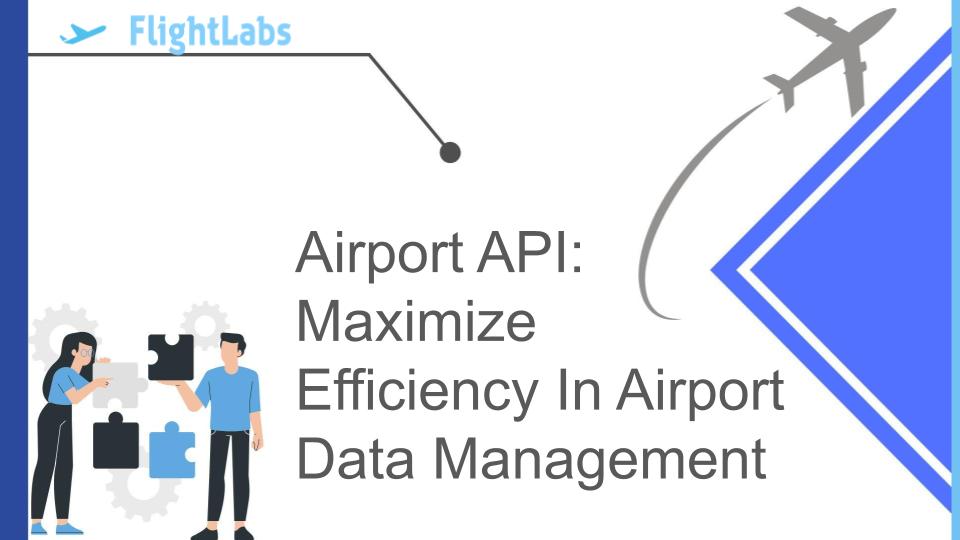Airport API: Maximize Efficiency In Airport Data Management

In today's fast-paced aviation industry, efficient data management is crucial for airports to streamline operations, enhance passenger experiences, and ensure safety and security. Airport APIs play a vital role in maximizing efficiency in airport data management by providing real-time data access, automation capabilities, and seamless integration with various systems. In this blog post, we'll explore how Airport APIs help airports maximize efficiency in data management and improve overall operational effectiveness.
Real-Time Data Access:
One of the key benefits of Airport APIs is real-time data access. These APIs provide airports with instant access to critical information such as flight statuses, gate assignments, baggage handling, and security updates. By accessing real-time data, airports can make informed decisions quickly, optimize resource allocation, and respond promptly to changing operational conditions, ultimately improving efficiency and passenger satisfaction.
Automation And Integration The Best API Using FlightLabs
FlightLabs enables automation of routine tasks and seamless integration with internal systems and third-party applications. For example, APIs can automate flight check-in processes, baggage tracking, passenger notifications, and aircraft maintenance scheduling. Integration with airline systems, airport management software, and security protocols streamlines operations, reduces manual errors, and enhances overall data management efficiency.

Efficient Resource Allocation:
With FlightLabs, airports can efficiently allocate resources based on real-time data insights. For instance, APIs can provide data on passenger flow patterns, flight schedules, and security checkpoint wait times, allowing airports to adjust staffing levels, optimize gate assignments, and allocate resources where they are most needed. This proactive approach maximizes resource utilization and minimizes operational bottlenecks.
Improved Passenger Experience:
FlightLabs plays a crucial role in enhancing the passenger experience by providing personalized services, real-time updates, and seamless navigation throughout the airport. For example, APIs can power mobile apps that offer digital boarding passes, flight status notifications, wayfinding assistance, and airport amenities information. By leveraging APIs, airports can create a seamless and enjoyable experience for travelers, leading to higher satisfaction rates.
Data Analytics and Insights:
FlightLabs offers advanced data analytics and insights capabilities, allowing airports to analyze trends, track performance metrics, and derive actionable insights from vast amounts of data. For instance, APIs can analyze passenger behavior, flight punctuality, baggage handling times, and security incidents to identify areas for improvement and implement data-driven strategies for operational efficiency.
Enhanced Safety and Security:
FlightLabs contributes to enhanced safety and security measures by providing real-time updates on security threats, emergency situations, and regulatory compliance requirements. APIs can integrate with security systems, surveillance cameras, access control systems, and screening technologies to monitor airport activities, detect anomalies, and respond swiftly to potential security risks, ensuring a safe and secure environment for passengers and staff.

Streamlined Communication:
FlightLabs facilitate streamlined communication channels between airport stakeholders, airlines, ground handlers, and other service providers. APIs can enable real-time data sharing, collaborative decision-making, and automated notifications for operational updates, flight changes, and emergency alerts. This streamlined communication enhances coordination, reduces communication gaps, and improves overall operational efficiency.
Scalability and Flexibility:
FlightLabs is designed to be scalable and flexible, capable of handling increasing data volumes, diverse use cases, and evolving technological requirements. Whether an airport serves a few hundred passengers or millions of travelers, APIs can scale to meet demand, integrate with new technologies, and adapt to changing operational needs, ensuring long-term efficiency and effectiveness in data management.
Conclusion:
In conclusion, FlightLabs plays a vital role in maximizing efficiency in airport data management by providing real-time data access, automation capabilities, seamless integration, efficient resource allocation, improved passenger experiences, data analytics insights, enhanced safety and security measures, streamlined communication, scalability, and flexibility. By leveraging these APIs, airports can optimize operations, enhance passenger satisfaction, and stay competitive in the dynamic aviation industry.